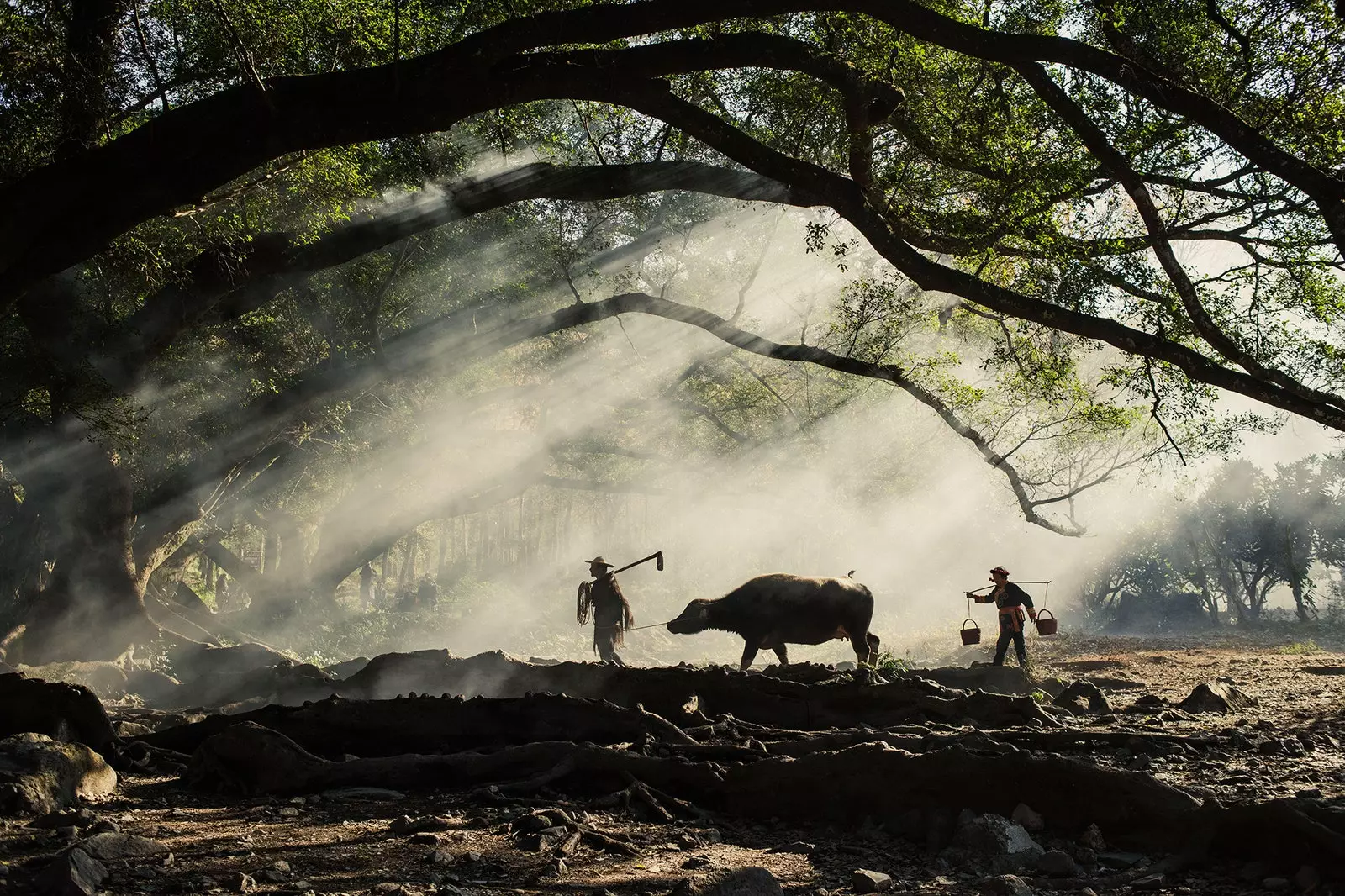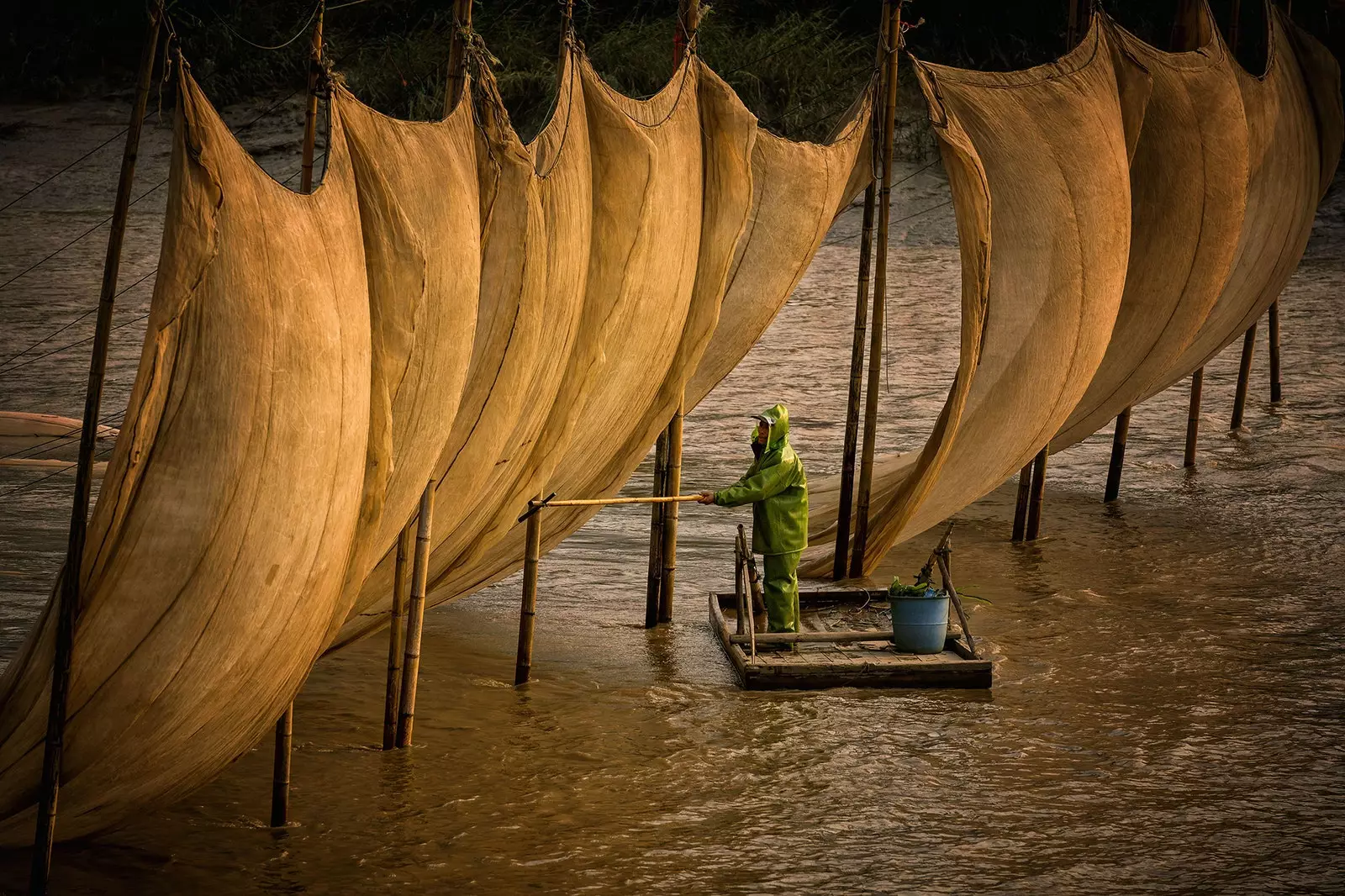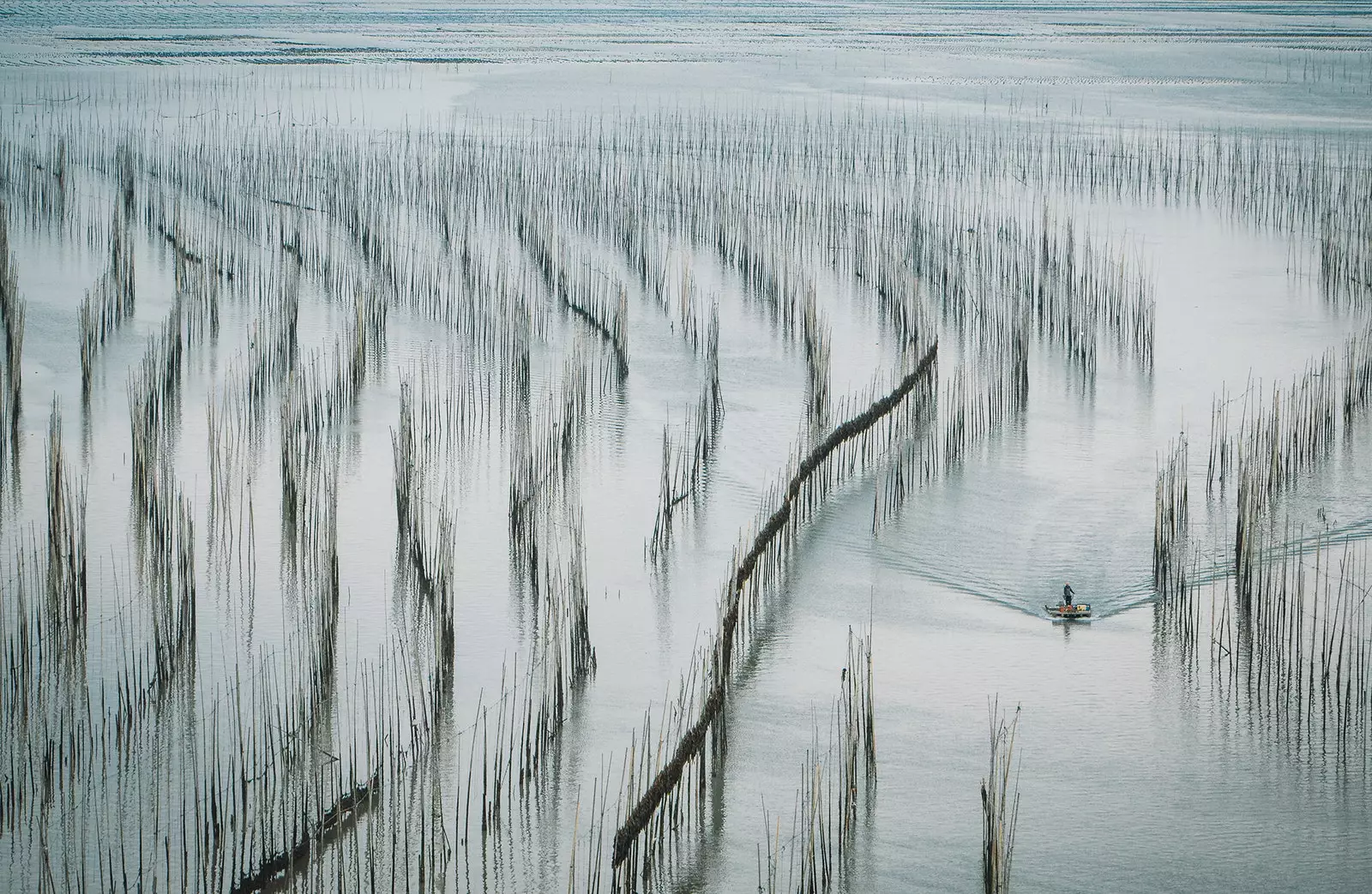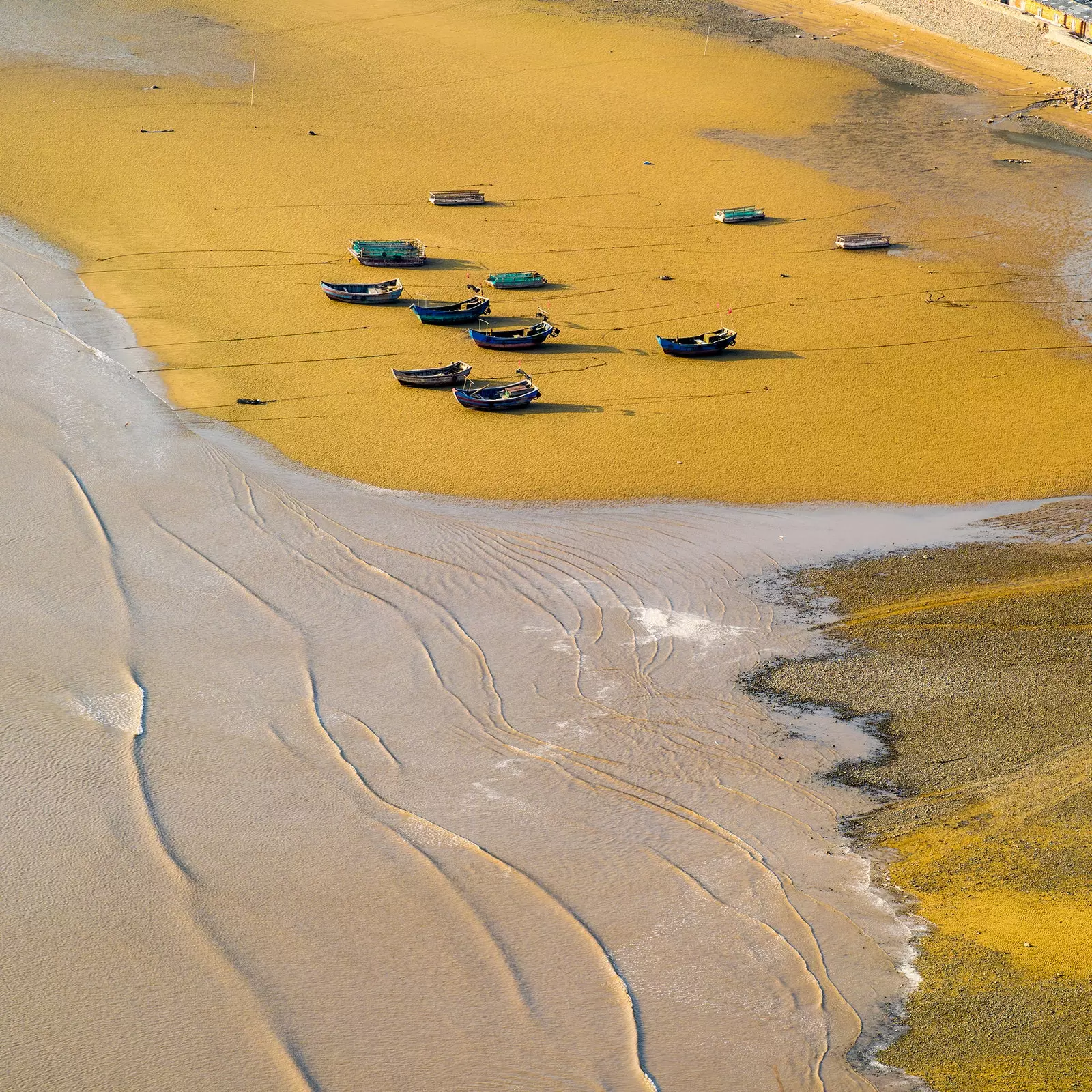The scenery in Xiapu County, China couldn't be more beautiful and picturesque: an old man fishes for crabs with an old net; a young woman herds her animals at sunset, dressed in her traditional Chinese clothing. The colors of the sky and nature are brilliant and the places are almost deserted.
We are in a dreamy Chinese coastal town, in a town of the prefectural city of Ningde, in Fujian province. But, if we could see outside the frame of the photo, we would see a group of photographers who follow the directions and tips from a tour guide who has prepared this bucolic postcard specifically for them.
Xiapu is a memory, an echo – a recreation, if you will – of what rural China was like in the past. A peninsula of fishing villages, beaches and lush hills in the East China Sea, that used to be known for its good seafood and that today we can track on social networks to enjoy the most beautiful and colorful snapshots: the hashtag #xiapu has more than 4,000 posts on Instagram.

Farmers walk with a water buffalo through Banyan trees in Yangjiaxi (Xiapu) village.
See photos: China's most spectacular natural landscapes
And it is that both Chinese and foreign visitors who travel there do it, mostly, to get the perfect photo. Numerous local businessmen offer to facilitate photo sessions, even providing models (local people dressed in typical traditional clothing, who follow the directions as if it were a shoot, waving colored nets at the ideal angle for the objective), others they burn straw (to add an interesting haze to some of these images) or work as tour guides.
What is more, many inhabitants of the county have acquired animals –sometimes saving them from the slaughterhouse– that they do not intend to use in their agricultural work but as… pure props.
It's all part of a local government plan, which has turned this decorated town into a viral phenomenon on the networks. Last June, journalist Vivian Wang explained in the New York Times how the county's economy had evolved to meet the demands of the Instagram era: “Between 2008 and 2019, the number of tourists who visited the region, once known mainly for agriculture and fishing, multiplied by ten according to official statistics.
For Vivian, there is merit in making this corner of the world such a desirable tourist destination – since in Xiapu, she says, the weather is usually cloudy and the beaches are somewhat muddy, not suitable for swimming, but said success is the result, in her opinion, of a conjunction of three factors. The first, a growing number of retirees with economic stability; in second place, the promotion of rural tourism by the government; and finally, the growing nostalgia for a way of life that is disappearing.
And what better than reuse tools and clothing in disuse… for new –and lucrative– purposes? As they say, it is a win-win, in which everyone wins: the traveler takes their photos worthy of a contest and, at the same time, the economy of a landscape is reactivated, on the other hand, not insignificant.

A fisherman, in Xiapu.
shang, of Adventure & Tour China travel agency, specialized in photo safaris, she tells Condé Nast Traveler that the phenomenon, however, is not as recent as it may seem. “ Photographers started coming here to immortalize the tidal flats in 2003. In 2008, Xiapu held the title of the most beautiful wetlands in China, although not many people knew about this locality".
“From 2010 to 2012, Xiapu appeared in some photography magazines as Top Ten, and more Chinese and even foreigners began to visit it," summarizes Shang, who emphasizes that after the commemoration of the centenary of the Communist Party, tourism is developing rapidly.
"The demand of the Chinese people has become more diversified, and the leisure and photography tourism industry is growing," she continues, and finishes: "In the last two years, with the rise of social networks and short video platforms such as Weibo (equivalent to Twitter or Instagram), Douyin (Tiktok) and Kuaishou (Kwai), the popularity of this site continues to grow.”
Shang introduces us to Xiapu as an ideal place to perfect the photographic technique: “The best reason to come is that the environment is unique, a good place to practice composition. Image and artistic conception are two important aesthetic categories in traditional Chinese painting and traditional Chinese art. Here naturalism, aesthetics and traditional artistic conception are integrated in the same place”.

A boat in the middle of a fish farm in Xiapu.
And beware, that they make your job easier to take the best photo does not mean that they give you everything done or that it is so easy: many get up before dawn to capture the most valuable image or wait for hours until the tide rises at the expected level.
Most of the visitors are Chinese, but Instagram is also full of posts from foreign visitors who proudly show what seems like a trip to the past (and not all specify, it is true, that they had 'help', hence some controversy regarding the authenticity of this place...). “Tourists also come from South Korea, Malaysia, Singapore, USA and other countries”, explains Shang.
THERE ARE MORE REASONS (ALSO GASTRONOMIC)
In Xiapu they do not only have travelers who are fond of shooting the camera or the mobile. "The seafood here is also famous," Shang reminds us. Funing Bay in the county is the only sea area in China where there is a harvesting industry. sword clams. In other words, you won't find this kind of thin-skinned, crispy, unusually flavorful meat elsewhere. You can taste them stewed, sautéed and steamed, they are always delicious.”
"The snail is also collected on Xiapu beach -he adds-, whose tail has a bitter taste. the locals like it fry them and add a little spice, They have a unique flavor."

Beiqi and Xiaohao.
Traveling here is worth it, sums up Shang, to also discover all these places: Yangjiaxi, where you will find a 'King Banyan' and the largest pure maple forest south of the Yangtze River; Beiqi Beach, a seaweed-growing area where the combination of light and shade and tidal flats make it ideal for photography; the east wall, perfect if you want to photograph the sunset and Xiapu beach, also perfect for taking photos; the beach Xiaopu Dajin, that the locals call in jest 'the Hawaii of Fujian'; and Huazhu Village, a unique location.
If you decide to travel to this corner of the world to unleash your skills as a photographer (or to discover how much truth is hidden behind fiction, that is also a great topic), also point out these hotels that Adventure & Tour China suggests: the beach photography themed hotel Xiapu North Qi ; the Hotel Vienna (at the train station); Imperial View of the Holiday Inn; the boutique hostel You Jian Yangjiaxi ; Light Seeking Art Seaview Hostel; Manhattan City Hotel; Home Inn and Super 8. And don't forget to share your photos!
